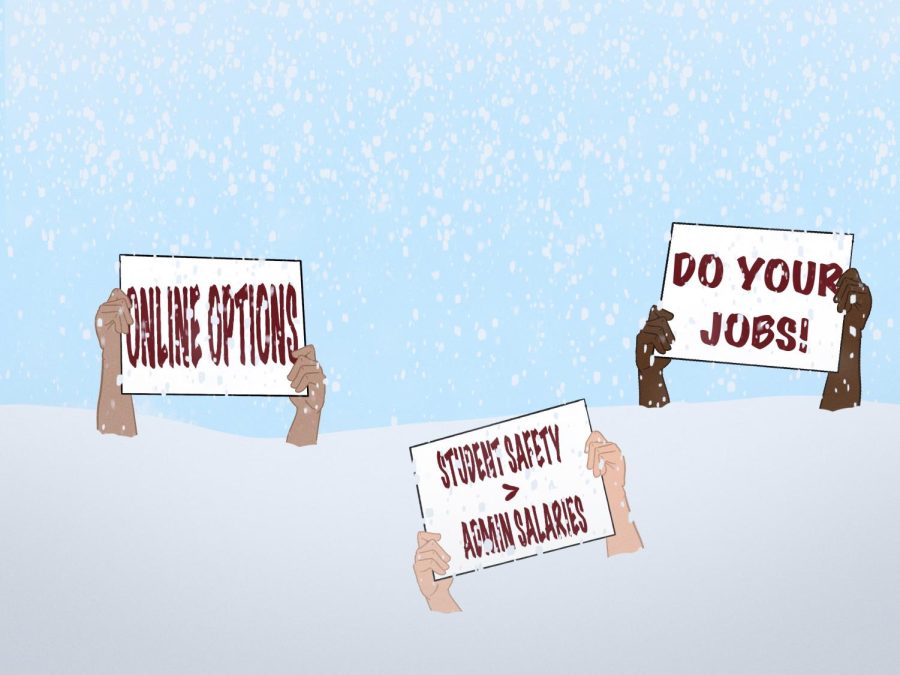OPINION: WSU administration puts money over safety of students, staff
Frustration evident among students and Jan. 6 COVID-19 Town Hall viewers
With the state of COVID-19 and the winter weather, admin is putting students and faculty at risk.
January 6, 2022
“Amazing job at taking a longer time to introduce the panel of people [than] addressing traveling back to Pullman from the West Side!”
“They don’t give a crap about our safety/health and they’re excited for us to come back and pay our tuition.”
“WTF was that?”
These were just a few comments left online during WSU’s COVID-19 Town Hall Jan. 6, which ended early in response to the frustration viewers expressed with the panel.
The Town Hall addressed two factors that are at the forefront of the minds of everyone who will be traveling back to Pullman this weekend for the start of the spring semester: the new omicron COVID-19 variant and the severe winter weather currently hitting our state.
Well, perhaps “addressed” is a rather strong word. The panel did not explain what the university administration is doing to support students and faculty at this time, so much as they delegated individual responsibility to anyone other than themselves.
Phil Weiler, WSU vice president for marketing and communications, advised travelers to check road and pass closures, travel preparedly and allow plenty of time to get to their location safely.
Ash Croxton, sophomore fine arts major, is one of many students who will be making the drive back to Pullman from the west side this weekend. Croxton expressed frustration at what Weiler and the rest of the panel had to say to students making this trip.
“I can’t control if the pass closes,” Croxton said. “’Give enough time,’ okay dude, you c’mere and drive it.”
If road conditions and closures do prevent students like Croxton from returning to Pullman in time for the start of the spring semester, administration has requested leniency from faculty regarding in-person attendance. However, in making this request they provided absolutely no guidance for faculty on what “leniency” really entails.
Does it mean offering online options for students? Making the decision to put their whole class online? Waiting for students to return so they can make up their missed work?
Professors already have enough on their plates without having to independently navigate every unique situation their students will be faced with, with no support or guidelines from administration.
Much of the burden of traversing the complex COVID-19 pandemic is also placed on staff and students.
At the Town Hall, panel members emphasized following Centers for Disease Control and Prevention guidelines regarding wearing face masks, isolating and, especially, getting vaccinated. However, much like they did with road conditions, they place most of the responsibilities of figuring these things out on staff and students.
They overemphasize vaccine accessibility – booster shots are available on campus, but only one day a week. And in a college town, not everyone has access to transportation to take them to clinics elsewhere.
Even assuming everyone has access to vaccines, some people are simply not able to get it for medical reasons. Immunocompromised people are being hung out to dry by the intense reliance on vaccines.
Vaccines are not even 100% effective in preventing the spread of COVID-19.
Do they prevent some spread? Yes. Do they lessen your symptoms? Absolutely. Should you still get it? Yes, if you can!
But laboring under the assumption that vaccines are the end all, be all of this pandemic is borderline delusional.
On Monday, the U.S. reported one million new cases of COVID-19 on its own. While hospitalizations and deaths are, luckily, lower than they were a year ago, they will only continue to rise with the number of new cases.
Other universities across the country have announced temporary suspensions of in-person activities as they begin their semesters. WSU has taken no such precautions.
The justification administrators provided is that we operate on the semester system rather than the quarter system and therefore begin a week later than other universities, so we will start at the same time anyway.
Thomas Metcalf, junior public relations major, called this justification “ridiculous.”
“Where other schools have a week to gauge COVID … we have students that are still coming into campus, like, the week before,” Metcalf said. “The week or two before school starts there’s not enough information that we can get out of COVID, out of current cases and all that stuff, so I think that it’s not a good idea for classes to start immediately.”
Nonetheless, administration announced (in their Zoom meeting) that they remain focused on the goal of getting all WSU students and faculty back in person right off the bat, no exceptions. This is to the chagrin of many who will actually be in classrooms.
“At least give the students who have medical issues, who are in the high-risk category, the option to do online,” Croxton said. “It’s the bare minimum they can do to protect student health.”
WSU President Kirk Schulz acknowledged that getting back to in-person operations is also extremely important for many people; no matter what decision is made at the administrative level, someone is not going to be happy with it.
Between the raging pandemic that has so far killed over 800,000 people in the U.S. and the deeply dangerous weather conditions in our state, many do not feel safe returning to campus right now. If someone is going to be unhappy no matter what, then the question is why not make the decision that is going to prioritize the physical health and safety of students and faculty?
The answer is simple.
It is the same thing that is forcing teachers to continue working in public schools with large populations of unvaccinated children.
It is the same thing that caused the CDC to lower the isolation period for COVID-19 exposure from 10 to five days after the CEO of Delta Airlines asked the director to.
The answer is money.
It is no secret that one of the primary roles of universities is glorified landlords. Millions of dollars are taken every year from students living and working on campus.
We are the heart of this university, and the simple fact is WSU administration needs us here to help make them more money.
The combined annual salary of the six panel members who spoke at the town hall today is in the millions. The average faculty member at WSU, meanwhile, makes less than $60,000 a year according to national salary database OpenPayrolls.
Those faculty members making $60,000 a year on average are the ones who are most at risk of contracting and spreading COVID-19, along with students who are individually paying thousands every year just to be here.
WSU’s administration is forcing us to put ourselves at risk to continue making them and the university millions.
Our lives are more important than money. The lives and safety of all essential workers, around the country and the world, are more important than profit.
Lately, the message from higher-ups (from university administrations to corporate CEOs to the federal government) seems to be that we need to learn to live with COVID-19. What that translates to, apparently, is that we need to be willing to put our lives and the lives of everyone around us at risk in order to keep making them money.
If even a single WSU student or faculty member loses their life to poor weather conditions or COVID-19 when we return to campus this spring, WSU administration can rest easy with money in their pockets and blood on their hands.










